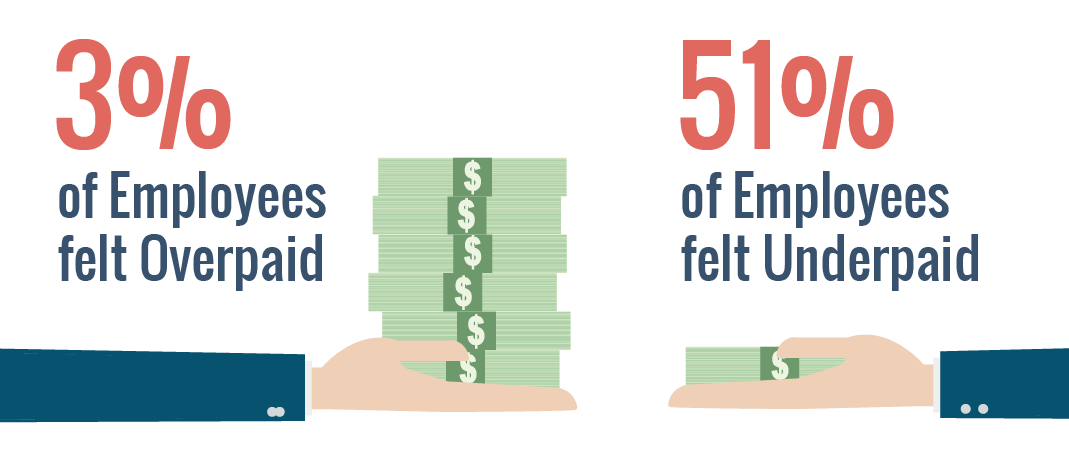
Employee Pay: Your Workers Are Expecting a Raise; Are You Prepared?

Ms. Pomerantz is the CEO of TPG HR Services USA and has over 35 years of Human Resources practices experience. She holds a Master’s in Human Resource Management (MHRM) and is a certified Senior Professional in Human Resources (SPHR) and SHRM Senior Certified Professional (SHRM-SCP). Mary also serves as CEO of Mary Pomerantz Advertising, one of the largest recruitment advertising agencies in the country. Earlier in her career, she was president of the 17th largest staffing firm in the country.

The Majority of U.S. Employees Feel Underpaid
Employee pay has become somewhat of a hot-button topic in recent months and years, with employees increasingly demanding higher wages to match the cost of living. It appears that many employers who made budget cuts and froze salaries following the Great Recession have created a new norm that’s more reflective of the economic climate from nearly 10 years ago, rather than one that reflects today’s environment.
Things like vacation days, benefits, and career growth are all important, but very little motivates the way money does. One 2014 survey revealed that chief financial officers and employees believed that money was the number one reason why workers leave their jobs and the top reason that keeps them there. Of the more than 2,100 CFOs surveyed, 28 percent said “inadequate salary and benefits” was the most likely reason for a good employee to leave his or her job. Of the nearly 300 employees surveyed, 38 percent cited inadequate employee pay as the most likely reason they would quit their jobs.
At some point, one of your more valuable employees will come to you and ask for a raise.
What makes this an even more pressing issue is that many employers around the nation are beginning to realize the importance of wages and are increasing salaries. According to Korn Ferry Hay Group’s 2016 Salary Forecast, American workers can expect an average wage growth of 2.7 percent in 2016. [1]
At some point, one of your more valuable employees will come to you and ask for a raise. You will have to determine whether he or she is worth the increase because denying them the raise could end up costing you your employee. We’ve assembled a few tips to help you deal with this inevitable situation.
Don’t Be Surprised
You should never be shocked that your employees want a bump in pay because it’s not uncommon for a worker to feel overworked and underpaid. A 2008 Gallup survey showed that 51 percent of the American population felt underpaid and only 3 percent felt overpaid. [2] A more recent survey conducted by the American Psychological Association revealed similar findings. More than 50 percent of employees surveyed in this poll also felt underpaid, underappreciated, and overworked.

Just assume that you and your employees are not in agreement on how well paid they are, and be prepared to respond to requests for pay raises.
Keep Your Cool
Keep in mind the courage it takes for one of your employees to ask for a raise.
No matter how prepared you are, an employee asking for a raise will at least give you some sort of jolt, if for nothing else other than being put on the spot. Now is not the time to get angry or act annoyed, even if you somewhat feel that way. Keep in mind the courage it takes for one of your employees to ask for a raise, and don’t make any immediate decisions about it. Assure your worker that you appreciate his or her contributions to the company and need to consider the request and discuss it with any partners or superiors you have. The key here is to buy some time, so saying something like “I appreciate your request and I will get back to you in two weeks,” appropriately placates your worker while giving you time to do research and think about the request.
Employee Pay: Do Internal and External Research

With volumes of information available at the touch of a smartphone app, you can be assured that your employee requesting a raise has done research about how much he or she should be earning, based on industry standards. You would be wise to conduct this research as well.
If your employee is asking for a fair raise that would be representative of what others in his or her position should be making, it may be worth doing what you can to keep them happy. Of course, if they are asking for an outlandish pay increase or are not performing up to the level they think they are, then you should explain this politely and perhaps set a performance benchmark for him or her to strive for in order to earn some salary increase.
Internal research is also important because you don’t want to be paying your employees at very different pay rates if they all have the same skills, education level, and job experience.
Make an Effort
Most employees just want some form of recognition for the work they do.
If you determine that your employee is deserving of a raise, you owe it to him or her to try your best to make it happen. If you’re not the sole decision-maker, speak to who you need to speak to and review your budget to see if there is room for a pay bump. If there is no budgetary flexibility to accommodate the raise, you need to convey this to your employee and explore any other compensation options available.
Most employees just want some form of recognition for the work they do and maybe understanding if your hands are tied on giving them more money. You may be able to offer other forms of compensation in the form of a one-time bonus, extra vacation time, a telecommuting option or other employee pay options. Be sure to stay away from making any negative comments about your employee’s performance. Instead, be positive and honest about the pay structure at your company.
Understand the Ramifications
Whether you decide to grant the raise or not, there will be consequences that follow. In the case that you do give your employee a pay increase, you must consider how this could affect your other workers. If you don’t give a raise, you must take into account how it will impact his or her morale and how this could also affect other staff members.

Ask Yourself These Important Questions
- How valuable is this employee? How will your business function without him or her?
- Can you afford to give a raise?
- Is the employee making a reasonable request?
- How will other employees view this? Will your office become a revolving door of pay increase requests?
Don’t Neglect Your Employee Relations
Effectively handling the needs, concerns, and requests of employees is an essential job function for a manager or business owner. Just as you need to be worried about generating revenue and growing your business, you also need to be concerned with your staff morale and maintaining open and honest lines of communication.
Unfortunately, many business owners are already strapped for time and don’t have the hours, resources, or manpower to handle it on their own. This is where an outsourced professional human resources agency will prove invaluable.
HR Services USA has provided consulting services for employee compensation and employee relations for dozens of companies both national and international for more than two decades. We have provided every type of HR function for over 7,000 employees. If you’d like a trained professional to be the bridge between you and your employees, consider the advantages of partnering with us. Contact our professionals at 732-917-6000 at any time to learn more.
